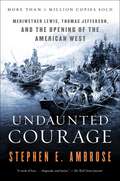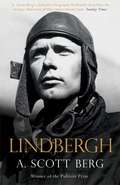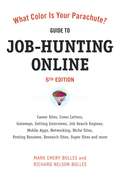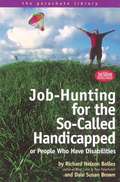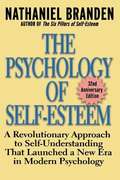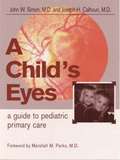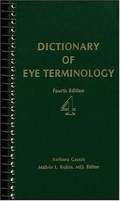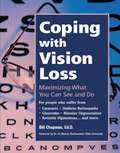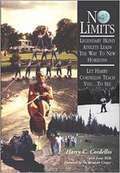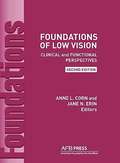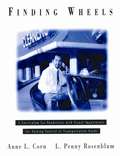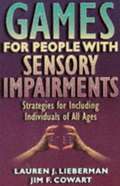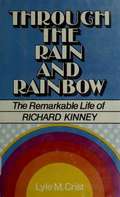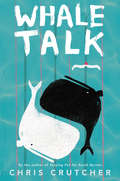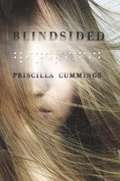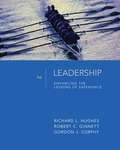Special Collections
Hadley School for the Blind Collection
Description: Recommended Reads for students at Hadley School for the Blind #disability #adults
- Table View
- List View
Undaunted Courage
by Stephen E. AmbroseIn this sweeping adventure story, Stephen E. Ambrose, the bestselling author od D-Day, presents the definitive account of one of the most momentous journeys in American history. Ambrose follows the Lewis and Clark Expedition from Thomas Jefferson's hope of finding a waterway to the Pacific, through the heart-stopping moments of the actual trip, to Lewis's lonely demise on the Natchez Trace. Along the way, Ambrose shows us the American West as Lewis saw it -- wild, awsome, and pristinely beautiful. Undaunted Courage is a stunningly told action tale that will delight readers for generations.
No One is Unemployable
by Debra L. Angel and Elisabeth E. HarneyExplains a 10-step process to overcome either the employer's or employee's barriers such as criminal record, lack of education, immigration, etc.
When Blind Eyes Pierce the Darkness
by Peter A. AngelesWith courage and determination, a young Greek girl journeyed to America to carve out a new life. Not long after her arrival, Kalliope married - only to have her dreams and aspirations ravaged by a disease that took her sight. Yet Kalliope faced life head-on and lived it to the fullest. Now eighty-four, Kalliope's thoughts, fears, hopes and dreams have been recorded by her son, Peter, in hopes that her keen insights will add to our understanding of life's choices and challenges.
White Coat, White Cane
by David Hartman and Bernard AsbellThe woman's arthritic fingers feel gnarled and crooked, her knees lumpy rocks. But I can detect no swelling, so I press here, there, trying to rouse an inflamed spot. "What are you doing"she challenges. "You're blind!"
"I'm examining you. Haven't you ever been examined by a blind doctor before?"
She refuses to be humored. "That's silly. What can a blind doctor do?"
"I'm not sure, but we're going to find out..."
When David Hartman, blind since the age of eight, announced his intention to become a doctor, the reactions ranged from sympathy to ridicule. How could he diagnose his patients? Examine them, except by touch? Look through a microscope? Even understand what was being described?
The battle lines were drawn: David and his family on one side, the schools and society on the other. But with an incredible strength of purpose, David Hartman went on to become the first blind person in over 100 years to enter medical school. What is it like to adjust to a world of darkness? David Hartman lets us know bluntly, with real emotion, insight, and humor. He had to relearn the simplest things. He had to overcome mental obstacles that were at times more formidable than the physical ones. Yet he was determined to reach beyond his difficulties to fulfill an impossible dream.
His teachers were helpful, hostile, embarrassed, unsure-and in medical school he had to work twice as hard. The work had to be read to him or translated into Braille. Often he had to rely on a sighted person to confirm his diagnosis, and he needed a nurse to read the patients' charts to him. But he utilized all his other senses to achieve his greatest desire: helping to heal. His journey is a moving and inspirational story for us all.
Career Perspectives
by Marie AttmoreInterviews and advice from blind and visually impaired professionals about education and breaking into the job market.
What Color Is Your Parachute? Guide to Job-Hunting Online (Sixth Edition)
by Richard Nelson Bolles and Mark Emery BollesBefore you start your Internet job-hunt, there are some things that you must know, like: * Why are job sites like Monster and CareerBuilder so stunningly ineffective? * What can you do to make sure your resumes survive the elimination process? * How do you find the information that search engines like Google can't? * How can you tell the difference between a genuinely helpful job board, and a website designed only to collect resumes? * When are hobby forums more helpful than business networking sites? * When is the Internet not helpful when job-hunting? * What is the fatal flaw of all social networking sites? The Guide to Job-Hunting Online, 6th Edition, not only answers these questions and many more, but shows you how to comprehensively and effectively use the Internet for all aspects of your job-hunt. This companion to What Color Is Your Parachute?, the best-selling job-hunting book in the world, has been completely rewritten for our changing times and includes hundreds of updated website recommendations and descriptions. The Guide to Job-Hunting Online shows you how to quickly find the data that will be most helpful to you, how to identify and research the places where you will most enjoy working, how to leverage the power of social networking sites, and how to use your Internet time most effectively, avoiding the common pitfalls and setting you up for success.
Job-Hunting for the So-Called Handicapped (Second Edition)
by Richard Nelson Bolles and Dale S. BrownRichard Bolles' What Color is your Parachute? has helped millions of readers find their path in life, and now his creative approach to job-hunting is brought to bear on the specific challenges faced by job hunters with disabilities. In Job-Hunting for the So-Called HandicappedM/i>, Bolles and Dale Susan Brown guide readers through the often-frustrating, but ultimately rewarding process of securing independence in their lives and personal satisfaction in their careers. The authors begin by demystifying the intricacies of the ADA, describing in clear terms what the act does and does not guarantee disabled job hunters, and then move on to job-hunting strategies tailored specifically to people with disabilities.
The Psychology of Self-Esteem
by Nathaniel BrandenSelf-esteem or self-evaluation determines the way we tackle every aspect of our lives. "Positive self-esteem operates, in effect, as the immune system of consciousness, providing resistance, strength, and a capacity for regeneration." (Nathaniel Branden)
More Than Meets the Eye
by Derek Gill and Joan BrockJoan Brock was a teacher at an Iowa school for the blind when her life was nearly prefect. Then tragedy struck not once but twice. Most people would have wallowed in self pity and asked Why me? This courageous woman decided to face her challenges and ask Why not me? Her story is to say the very least inspirational.
A Child's Eyes
by John W. Simon and Joseph H. CalhounThis quick easy to read reference book is written for primary care physicians, parents and non medical professionals. It covers many common childhood eye disorders / injuries and includes vivid descriptions of numerous eye conditions.
Dictionary of Eye Terminology, 4th Edition
by Barbara Cassin and Melvin L RubinThis comprehensive reference has been written for the purpose of making ophthalmological terminology comprehensible to the person without a scientific background.
Hong Kong Life & Culture
by Emily L. Y. ChanHere is a concise guide with information about living in Hong Kong. There are even tips about gift giving, gift receiving, tipping, dining, funerals and weddings.
Coping with Vision Loss
by Bill ChapmanLegally blind for 30 years, Chapman explains fundamental facts about eyes and vision, including the causes and varieties of blindness. He also examines the new skills the partially sighted person must learn. Specific approaches and devices are covered in depth, including "eccentric viewing" and driving with telescopic glasses.
Millicent
by Millicent Collinsworth and Jan WinebrennerLike a modern-day Scarlett O'Hara, Millicent was born into a Southern world of privilege -- a moneyed environment of homesteads, servants, family tradition, and pride. The halcyon days of her childhood left Millicent ill-prepared for the tragedy that would stalk her family and almost destroy it. Like dark cloak, her father's manic depression shrouds her family in shame, forcing them to leave the home they love and journey into a world of poverty, fear, and danger. Millicent becomes a pawn in her family's struggle for survival, nourished only by her dream of restoring her family's honor. But the journey home is a long one. Millicent must overcome sexual and physical abuse, failed relationships, and a perfectionism that leads to bulimia. As if that were not enough, a freak accident leads her to question her sanity and eventually results in her blindness. And so she must learn to live in a world without light... but, in the end, not without live.
No Limits
by Harry C. Cordellos and Janet WellsImagine a blind person water-skiing, golfing, running a marathon, and even diving. Harry Cordello did not let his blindness limit his activity. Instead he asked himself "Why not"?
Foundations of Low Vision
by Jane N. Erin and Anne CornThe editors and contributors of this book provide an examination of the clinical and functional perspectives of low vision. New to the second edition are revisions in all areas, state-of-the-art technology, a reorganization to examine in more depth the needs of individuals in different age ranges, new charts, certification requirements for low vision therapists, and information on pathology, early development, and discussion of the relationship between the vision and the brain.
Finding Wheels
by Anne L. Corn and L. Penny RosenblumThis text comprises explanatory material, activities, and numerous case studies profiling individuals and their families. The goal is to help visual impaired adolescents come to terms with the practical difficulties, the emotional obstacles, and the serious consequences of their attitudes toward getting around. Annotation c. Book News, Inc., Portland, OR (booknews.com)
Games for People with Sensory Impairments
by Lauren J. Lieberman and Jim F. CowartThis unique and valuable collection of games and activities, developed by innovative practitioners, fills a long standing need for a book about teaching student with sensory impairments accompanied by multiple disabilities. I recommend this book highly for use in both inclusive and segregated settings. Diane H. Craft, PhD Professor, Department of Physical Education SUNY Cortland College, NY
Through the Rain and Rainbow
by Lyle M. CristRichard Kenny lost his sight at age seven. He spent his childhood adjusting to and overcoming blindness. He entered college but had to drop out in his second year when his hearing failed.
The next ten years contained motes of both great anguish and sweet victory as he adjusted to being totally deaf-blind. With perseverance, the support of family and friends, and the counsel of such leaders as Helen Keller and other workers for the deaf and blind, Kenny became the third deaf-blind person in history to earn a college degree. He married, became a father, traveled and wrote.
Whale Talk
by Chris CrutcherA varsity letter jacket: it's exclusive, nearly unattainable, revered . . . and everything that's screwed up about Cutter High, as far as T. J. Jones is concerned.
That's why T. J. is determined to have the Cutter All Night Mermen--the unlikeliest swim team a high school has ever seen--earn letter jackets of their own. It won't be easy.
For one thing, they don't even have a pool. They will fight for their dignity, they will fight with each other, and sometimes they will just fight. And then they will realize that a single moment can bring lifelong heartache or lifelong friendship.
For T. J. and his crew of misfits, the quest may be far more valuable than the reward.
Blindsided
by Priscilla CummingsIn many ways, Natalie O'Reilly is a typical fourteen year old girl. But a routine visit to the eye doctor produces devastating news: Natalie will lose her sight within a few short months. Suddenly her world is turned upside down. Natalie is sent to a school for the blind to learn skills such as Braille and how to use a cane. Outwardly, she does as she's told; inwardly, she hopes for a miracle that will free her from a dreaded life of blindness. But the miracle does not come, and Natalie ultimately must confront every blind person's dilemma. Will she go home to live scared? Or will she embrace the skills she needs to make it in a world without sight?
Leadership
by Richard L. Hughes and Robert C. Ginnett and Gordon J. CurphyLeadership: Enhancing the Lessons of Experience consists of 13 chapters and three leadership skills sections integrated into the text. Authors Hughes, Ginnett, and Curphy draw upon three different types of literature--empirical studies; interesting anecdotes, stories and findings; and leadership skills--to create a text that is personally relevant, interesting, and scholarly. The authors' unique quest for a careful balancing act of leadership materials helps students apply theory and research to their real-life experiences. The Sixth Edition has been thoroughly updated in virtually every chapter.
